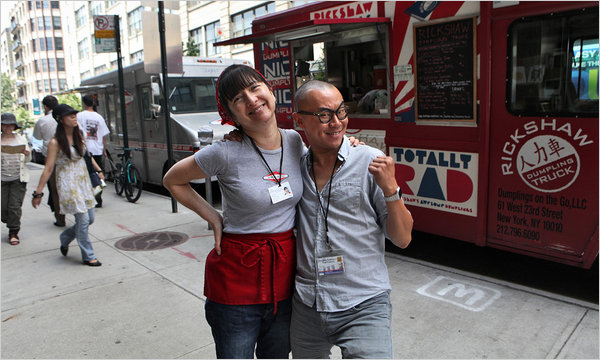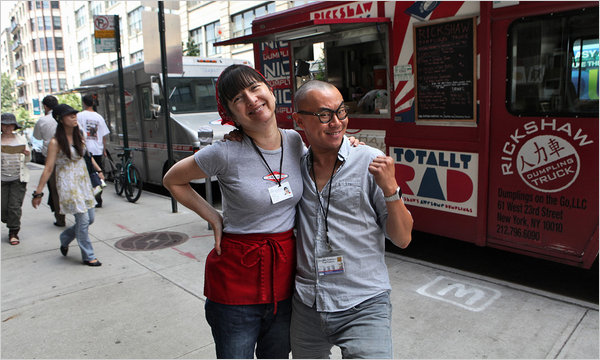FOOD trucks, those rolling symbols of New York City’s infatuation with haute casual food, are suddenly being chased from Midtown Manhattan. In the last 10 days, the Treats Truck, which has soldcookies and brownies for four years during lunchtime at West 45th Street near Avenue of the Americas, has been told by police officers that it is no longer welcome there, nor at its late-afternoon 38th Street and Fifth Avenue location. The Rickshaw Dumpling truck, a presence for three years at West 45th Street near the Treats Truck, has been shooed away as well.
The police “have told us they no longer want food trucks in Midtown,” said Kim Ima, the owner of the Treats Truck, a pioneer of the city’s new-wave food-truck movement, who began cultivating customers on West 45th Street in 2007.
Also ejected from their customary Midtown locations recently were the Comme Ci, Comme Ça Truck at 38th Street and Broadway; the Desi Truck at West 50th Street between Seventh Avenue and Avenue of the Americas; the Eddie’s Pizza Truck, the Kimchi Taco Truck and the Wafels & Dinges Truck, all at West 52nd Street and the Avenue of the Americas; the Crisp on Wheels truck at West 51st Street and Seventh Avenue. Members of the ragtag fleet of generic soft ice cream trucks in the area have been cast out, too.
Few if any of these trucks have been ticketed, and few towed. Nevertheless, some vendors who tried to return have been shooed away again. Many, including the Treats Truck, consider themselves permanently displaced and are trying to find other locations. In some cases, they have been turned out of their new neighborhoods, too.
Kenny Lao, an owner of the four Rickshaw Dumpling trucks, said that one of his vehicles was told to leave a metered parking spot at Hudson and Houston Streets in downtown Manhattan. Mr. Lao was tracked down in exile on West 39th Street, where an advertising agency had invited one of Mr. Lao’s trucks to park in its loading zone.
Regular customers are mystified and vexed at the absence of the trucks. “When I walked out of the office and the Treats Truck wasn’t there, I got angry,” said Mitchell Donk, a tax accountant at RSM McGladrey nearby, who has been so devoted a regular for four years that one of Ms. Ima’s cookies — Coconut Mitch — is named after him. “This is part of my lunch tradition.”
David Weber, president of the New York City Food Truck Association, which represents 24 vendors, said the police activity is a result of a May 24 ruling by Judge Geoffrey D. Wright in New York State Supreme Court. The decision reinforced a city Transportation Department regulation, believed to date from the 1950s, stating that no “vendor, hawker or huckster shall park a vehicle at a metered parking space” to offer “merchandise for sale from the vehicle.”
“Until now this law was very inconsistently enforced,” Mr. Weber said, “but now Judge Wright’s decision is trickling down to the precincts.”
The new sweep will affect not just Midtown but all five boroughs. “We are enforcing the law as it has been interpreted by the court,” said Paul J. Browne, the New York Police Department’s chief spokesman. He said that Judge Wright’s decision had caused “a change in summonsing” but added that so far, officers have been issuing warnings, rather than summonses.
As the police are asking the trucks to move along, another branch of city government has been wooing them. Adrian Benepe, the parks commissioner, has recruited a dozen high-end food trucks to the city’s parks and is actively seeking more.
“We continue to work with food truck owners and help them identify appropriate locations,” said Samantha Levine, a spokeswoman from the office of Mayor Michael R. Bloomberg. “Food trucks can provide New Yorkers with an array of lunchtime alternatives as long as they do it legally, sensibly and safely, without impeding traffic or obstructing pedestrians.”
Some vendors are reeling. “I spent years building up customers in those locations, and we’re suddenly cut off from them,” said Ms. Ima, who employs three people on the Treats Truck and five people in a bakery that supplies it.
Mr. Lao and other food-truck operators said they suspect that the police are responding to complaints by brick-and-mortar businesses that resent competition. Such was the case last year, when store merchants on the Upper East Side complained about Patty’s Taco Truck, which sold tortas, tacos de lengua and cemitas on Lexington Avenue. The truck was towed several times and the operator arrested, prompting the Street Vendor Project, an advocate for vendors based at the Urban Justice Center, to file the lawsuit that resulted in Judge Wright’s ruling, which said food is merchandise that can be regulated.
To vendors who have been routed, recovery is often not a simple matter of driving to a new spot nearby. “It takes trucks an hour to set up, so if the police shut them down at noon, by the time they go elsewhere and set up again, they have lost their lunch sales,” Mr. Weber said.
Some of the vendors said there is a disconnect between the growing popularity of the trucks and their ability to operate in the city. “They’re building all these fancy food trucks now, but they have no place to go,” said the operator of a soft ice cream truck on West 45th Street near Avenue of the Americas. The police have shooed him from the location several times, he said. He declined to give his name because he thought he might be targeted.
“Food trucks are part of the fabric of the city and the culture of the streets,” Ms. Ima said, noting that “a lot of out-of-town tourists put the trucks on their itineraries. There are even walking tours stopping at the trucks.” [NY Times] by Glenn Collins



